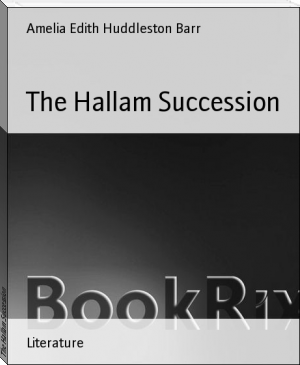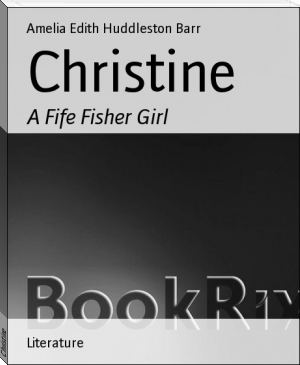The Hallam Succession, Amelia Edith Huddleston Barr [desktop ebook reader .txt] 📗

- Author: Amelia Edith Huddleston Barr
Book online «The Hallam Succession, Amelia Edith Huddleston Barr [desktop ebook reader .txt] 📗». Author Amelia Edith Huddleston Barr
"Clar' I don't know, Miss Phill. 'Pears like you'se on a bery dangerous road. I reckon you'd best pray for de grace to choose de cleanest, safest steppin'-stones."
"Yes; that is best, Harriet."
But Phyllis was not one of those rash beings who rush into the presence of God without thought or solemnity. Slowly bending, body and soul, she communed with her own heart and was still, until it burned within her, and the supplication came. When she rose from her knees, she was resigned in all things to God's will, no matter what self-denial it involved; and she was not unhappy. For, O believe this truth, the saddest thing under the sky is a soul incapable of sadness! Most blessed are those souls who are capable of lodging so great a guest as Sorrow, who know how to regret, and how to desire, and who have learned that with renunciation life begins.
And Phyllis foresaw that renunciation would be the price of peace. At the commencement of the inquiry with her own soul she had refused to entertain the idea. She had tried to find reasons for seeking some other human adviser than Bishop Elliott, because she feared that he would counsel hard things to her. Ere she slept, however, she had determined to go to him very early in the morning.
But while she was drinking her coffee John Millard entered the room. He took her hands, and, looking sorrowfully into her face, said, "Phyllis, my dearest, it was not my fault."
"I believe you, John."
"And you love me, Phyllis?"
"I shall always love you, for I believe you will always try to deserve my love. But we must part at present. I was just going to ask the Bishop to tell you this. I can trust you, John, and you can trust me. He will tell you what you ought to do. And don't think hard of me if I say 'good-bye' now; for though Richard went to the plantation last night, he may be back any hour, and for my sake you must avoid him."
"Phyllis; you are asking a very hard thing. Richard has said words which I can scarcely ignore. Two or three men have inquired if I was going to put up with them?"
"What kind of men?"
"Captain Lefferts and Jim Wade and--"
"Nay, you need say no more. Will you sacrifice my happiness to the opinion of Captain Lefferts and Jim Wade? Are you their slave? Richard is not himself now; if you permit him to force a fight upon you, you will both sorrow for it all your lives."
"I will go and see the Bishop, and do whatever he tells me. If I need a defender from ill words--"
"You may safely leave your good name in his care, John. And who would dare to dispute a word he said? Dear John, I knew I could trust you. Goodbye, my love!"
He drew her to his breast and kissed her, and with a look of fervent, sorrowful love, was leaving the room, when Richard entered by another door. He intercepted the glance, and returned it to John with one of contemptuous defiant anger. It did not help to soothe Richard that John looked unusually handsome. There was a fire and persuasion in his face, a tenderness and grace in his manner, that was very irritating, and Richard could neither control his hands nor his tongue. He began at once to feel for his pistol. "Why is John Millard here?" he asked of Phyllis. "Answer me that."
"He is here to promise me that he will not put the name of Phyllis Fontaine in the month of every drunken gambler and scornful man and woman to satisfy his own selfish, false pride."
"He is too big a coward to fight a gentleman, he prefers fighting half-armed savages; but I propose to honor his behavior with more attention than it deserves unless he runs away."
"John, dear John, do not mind what Richard says now. He will be sorry for it. If you care for me, ever so little, you will not fight about me. The shame would kill me. I don't deserve it. I will never marry a man who drags my name into a quarrel. Richard, for our mother's sake, be yourself. Brother, you ought to protect me! I appeal to you! For God's sake, dear Richard, give me that pistol!"
"Phyllis," said John, "I will go. I will not fight. Your desire is sufficient."
"Coward! You shall fight me! I will call you coward wherever I meet you."
"No one, who knows us both, will believe you."
It was not the taunt, so much as the look of deep affection which John gave Phyllis, that irritated the angry man beyond further control. In a moment he had struck John, and John had cocked his pistol. In the same moment Phyllis was between them, looking into John's eyes, and just touching the dangerous weapon. John trembled all over and dropped it. "Go your ways safely, Richard Fontaine. I could kill you as easy as a baby, but for Phyllis's sake you are safe."
"But I will make you fight, sir;" and as he uttered the threat, he attempted to push Phyllis aside. Ere one could have spoken, she had faced Richard and fallen. Her movement in some way had fired the cocked pistol, and, with a cry of horror, he flung it from him. John lifted her. Already the blood was staining the snowy muslin that covered her breast. But she was conscious.
"Kiss me, John, and go. It was an accident, an accident, dear. Remember that."
"Stay with her, Richard. I will go for a doctor, my horse is saddled at the door;" and John rode away, as men ride between life and death. Richard sat in a stupor of grief, supporting the white form that tried to smile upon him, until the eyes closed in a death-like unconsciousness.
CHAPTER VI.
"Who redeemeth thy life from destruction."
"Strike--for your altars and your fires;
Strike--for the green graves of your sires;
God, and your native land!"
The hours that followed were full of suffering to the heart. John came back with the doctors he summoned, and during their investigation he walked restlessly up and down the room in which the tragedy had occurred. Richard never noticed him. He sat in a chair by the open window, with his head in his hands, quite overcome by grief and remorse. It was in John's strong arms Phyllis had been carried to her own room, and no one now disputed his right to watch and to wait for the doctors' verdict. He was very white; white through all the tan of wind and sun; and, as he paced the room, he wrung his hands in an agony beyond speech. Terrible, indeed, to both men was the silent house, with the faint noises of hurried footsteps and closing doors up stairs! What a mockery seemed the cool, clear sunshine outside! What a strange sadness there was in the call of the crickets, and the faint blooms of the last few flowers! There are scenes and sounds which, as backgrounds to great events in life, photograph themselves in their smallest details upon the mind. In the midst of his distress John could not help noticing the pattern of the wall-paper, and the rustling of the dropping leaves and nuts in the garden.
He pitied Richard; for, even in the depth of his own sorrow, he perceived a grief he could not touch--the anguish of a remorse which might have no end in this life. As the doctors came down stairs John went to meet them, for even a minute's reprieve from his torturing anxiety was worth going for. The foremost made a slight movement, a motion of the lips and eyes which somehow conveyed a hope, and when he heard the words, "She may recover," he hastened back to Richard, and said, "There is a hope for her, and for us. God forgive us!"
Richard never answered a word, and John wandered for hours upon the beach, gazing at the gray melancholy sea, and trying to understand how far he had been to blame. Perhaps it is in the want of pity that the real _infernal_ of Satan consists; for whenever he sees us overwhelmed with sorrow, then he casts into our throbbing heart his fiercest weapons. Doubt, anguish, and prostration of hope, worse than death, assailed him. He tried to pray, but felt as if his cries were uttered to an inexorable silence.
As for Richard, he was so mentally stunned that it was not until he had been taken to Phyllis, and she had whispered, "I shall be better soon, Richard," that a saving reaction could be induced. Then the _abandon_ of his grief was terrible; then he felt something of that remorse for sin which needs no material fiery adjunct to make a hell for the soul. The Bishop watched him with infinite pity, but for several days offered him no consolation. He thought it well he should sorrow; he wished him to know fully that humiliation which Jesus exalts, that wretchedness which he consoles, that darkness which he lightens.
So, when he heard him one night, muttering as he walked gloomily up and down, "O that I could forget! O that I could forget!" he answered, "Not so, son Richard. Can you escape eternity by forgetting it? And even for this life to forget is a kind of moral forfeiture, a treason against your own soul. Forget nothing, carry every thing about yourself to God--your weakness, your regrets, and your desires."
"How can the infinite God heed my pitiful regrets and desires?"
"Because he loves men individually; he deals with them soul by soul. You, Richard Fontaine, you, your very self, must go to him. You are not only a sinner in the general mass, but a particular sinner under your own name and in your special person. So, then, for you he has a special pardon. He has the special help you need; the very word of grace, that your soul, and yours only, may be able to understand."
"O that God would pity me!"
"You belong to the God of compassions. He resists the proud, but he comes to abide with the broken in spirit."
"If I was only sure Phyllis would recover!"
"And if not?"
"Then I have no hope for this life or the other."
"God will do what seemeth good to him."
"I do not understand--God seems so indifferent to my cries."
"My son, God's indifference does not exist; and if to comprehend the cross of Christ, you must suffer to extremity, I would not spare you, Richard; though I love you. There are four words that you can say, which will shake the gates of heaven; which will make the Father meet you, and the elder Brother welcome you, and the angels sing for joy. Desolate souls, full of anguish, and yet full of hope, have comprehended them: _Have mercy upon me!_"
But the soul is a great mystery. How often is it called, and will not answer. Richard for many weeks could neither believe, nor yet ardently desire. The hour in which he heard that Phyllis was out of danger was the hour of his spiritual deliverance. Then a speechless, overwhelming gratitude took possession of him. He went





Comments (0)